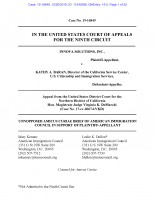- Amicus Briefs
Council Submits Amicus Brief Supporting Reversal of USCIS’ Misinterpretation of the First Regulatory Test for an H-1B Specialty Occupation
Published
The American Immigration Council filed this brief in support of a U.S. employer’s challenge to the U.S. Citizenship and Immigration Service’s (USCIS) denial of a computer programmer H-1B petition. The employer appealed to the U.S. Court of Appeals for the Ninth Circuit after the district court upheld the denial. Innova Solutions, Inc. v. Baran, No. 19-15849 (9th Cir.). Innova limited its appeal to USCIS’ decision that Innova did not meet the first regulatory test for a “specialty occupation:” that a bachelor’s degree is “normally required.” In reaching this conclusion, USCIS relied solely on the Department of Labor’s Occupational Outlook Handbook (OOH) entry for computer programmers. The OOH stated that “[m]ost computer programmers have a bachelor’s degree in computer science or a related subject; however some employers hire workers with an associate’s degree …” The OOH also stated that a bachelor’s degree is the “[t]ypical level of education that most workers need” to enter this occupation. Yet, USCIS concluded that “computer programmers are not normally required to have a bachelor’s degree.
The Council’s amicus brief explained that the first regulatory test is a categorical determination as to the normal requirement for the occupation and that the OOH entry for computer programmers was sufficient evidence to establish that computer programmer was a “specialty occupation” under this test. The Council’s amicus brief addressed how USCIS significantly misinterpreted the OOH when the agency claimed that the occupation “allowed for a wide range of educational credentials, including an associate’s degree” and that “most” computer programmers obtain “either” a bachelor’s or an associate’s degree. The Council explained that this misreading alone required reversal – if the OOH had actually said “either” was required, then this would have been a valid reason to deny on the first regulatory test. But the agency could not reach this decision based on what the OOH actually said. The Council also discussed USCIS’ arbitrariness in ignoring the OOH’s use of words such as “most” or “typically,” which demonstrated the “normal” education requirement of a bachelor’s degree in computer science or a related subject and instead rejecting the OOH for not parroting the statutory definition of the degree requirement.
On December 16, 2020, the appellate court concluded that USCIS’ denial was arbitrary and capricious, reversing the district court. The court found USCIS’ “contrary reason beyond saving. There is no ‘rational connection’ between the only source USCIS cited [the OOH], which indicated most computer programmers have a bachelor’s degree and that a bachelor’s degree is not normally required.” The court had no patience for USCIS’ attempt to distinguish “normally” from “typically” and “most,” stating:
“While it is theoretically possible that there is ‘space’ between normally, most, and typically, that space is at best molecular, and nowhere near big enough for the doublespeak freight train that USCIS tries to drive through it.”
The Council’s clear explanation of the flaws in USCIS’ denial is reflected throughout the appellate decision.

